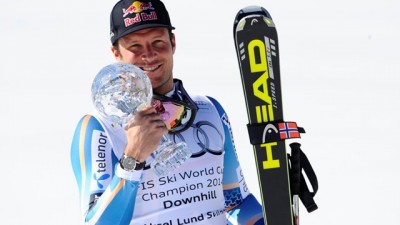Norway’s slalom skiing star Henrik Kristoffersen, caught in a sponsorship conflict with the national skiing federation, appeared both dejected and resigned when he finally agreed to be interviewed on Norwegian Broadcasting (NRK) Sunday evening. He has also confirmed that he won’t take part in the upcoming World Cup race in Levi, Finland this weekend.

“Right now there’s so much noise around me that I hope they (his national teammates) will be able to prepare as well as they can (without him),” Kristoffersen told NRK. “They should be allowed to do what they want to do, without being caught up in the situation the ski federation has put me in.”
He claimed his absence is mostly out of consideration for the team, but at the same time, Kristoffersen admitted he “hadn’t heard a word” from any of his teammates since news broke last week that he was suing the ski federation (Norges Skiforbundet) for the right to accept a lucrative sponsorship with energy drink maker Red Bull. The national alpine team’s veteran downhill race Aksel Lund Svindal has been allowed to race with Red Bull as a private sponsor on his helmet, and Kristoffersen thinks he should be allowed to do the same.
While some legal experts think Kristoffersen has a good case, and a solid chance of winning at least at the appeals court levels, the 22-year-old slalom skier has not won much support from either his teammates or some of his sport’s legendary racers. Former slalom World Champion Tom Stiansen, who now works as a skiing commentator for Eurosport, told Oslo newspaper Aftenposten that he thinks Kristoffersen’s decision to sue was “petty” and that it shows Kristoffersen “is not a team player.” Svindal’s Red Bull sponsorship was agreed before current team financing rules were put in place, Stiansen noted, and NRK has reported that Svindal turns over 40 percent of his Red Bull earnings to the federation.
Kristoffersen’s far has said his son would be willing to share his sponsorship earnings with the team as well. Such deals, though, “challenge” Norway’s sponsorship model and principles, however, and Stiansen was not convinced. He even told Aftenposten that the lawsuit was “a sign of bad character, both from Kristoffersen and the people around him,” suggesting that they “should have been able to settle the disagreement in a proper way without hiring lawyers.”

Multiple Olympic gold medalist Kjetil André Aamodt and fellow former downhill racer Finn Christian Jagge weren’t as tough in their assessments of Kristoffersen’s legal action, but had reservations. The ski federation, Aamodt told Aftenposten, “must, first of all, settle on their regulations. I can well understand that Henrik (Kristoffersen) reacted badly that he couldn’t accept the same agreement (as Svindal).
“At the same time,” Aamodt continued, “there are others who haven’t sued, and who view Svindal’s agreement as a one-time deal that came up when the ski federation had economic problems.” He added that sponsorship conflicts have flared up since the end of the 1980s.
Jagge doesn’t think Svindal’s and Kristoffersen’s Red Bull deals can be compared. “The most important thing is to be loyal to sponsors and, first of all, the federation’s sponsors,” Jagge told Aftenposten. “Your own sponsors should come second.”
The federation’s decision to make an exception in Svindal’s case, and the exceptions made for cross-country skier Petter Northug have complicated the issue, Aamodt noted. The new sponsorship rules came after Northug threatened to leave the national team unless he could sport the logos of his own personal sponsors. A compromise came when Northug was allowed to wear their logos during the off-season. When the World Cup circuit begins, he can only feature team sponsors.
Kristoffersen has said he thinks the entire conflict is sad, and he admitted that he missed getting more support from his reportedly silent teammates themselves. They would benefit as well from a Red Bull sponsorship, he said, although he alone would get various advantages like private jet travel to and from races and extra top-level training facilities. That, he argued, “would make me a much better skier.”
Kristoffersen, widely viewed as Norway’s new slalom star before all the trouble broke out, won the World Cup race at Levi in 2014. Last season he won six slalom victories. He said it wasn’t easy to pass up this weekend’s race.
“It of course means a lot to me, there’s nothing positive about this,” he told NRK. “I want to ski and compete in races.” His next chance will be in Beaver Creek in early December. Until then, he expects to be training alone.
newsinenglish.no/Nina Berglund

